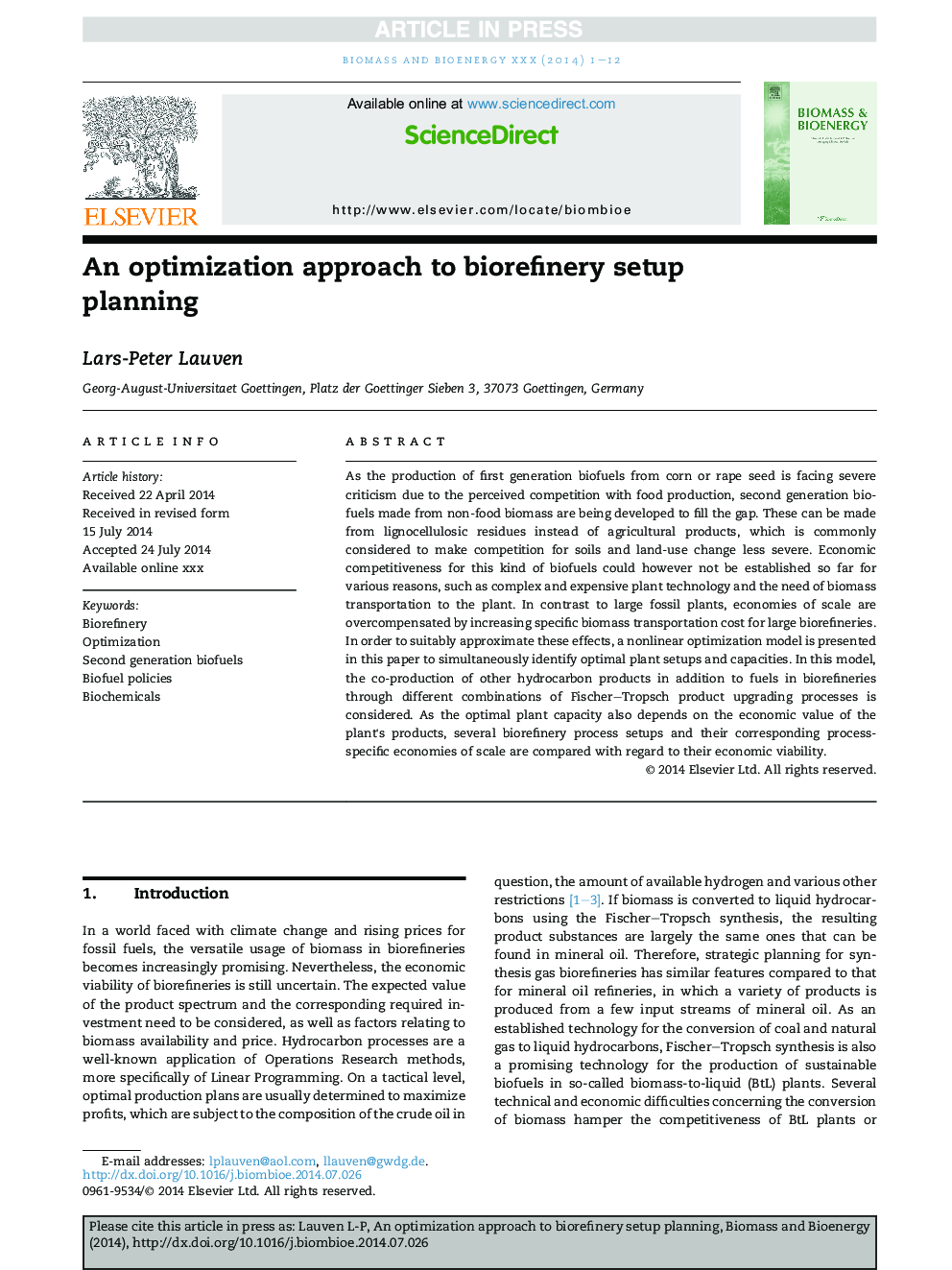| کد مقاله | کد نشریه | سال انتشار | مقاله انگلیسی | نسخه تمام متن |
|---|---|---|---|---|
| 7064235 | 1459823 | 2014 | 12 صفحه PDF | دانلود رایگان |
عنوان انگلیسی مقاله ISI
An optimization approach to biorefinery setup planning
ترجمه فارسی عنوان
یک رویکرد بهینه سازی برای برنامه ریزی راه اندازی بیورفینشن
دانلود مقاله + سفارش ترجمه
دانلود مقاله ISI انگلیسی
رایگان برای ایرانیان
کلمات کلیدی
ترجمه چکیده
تولید نسل اول سوختهای زیستی از دانه ذرت یا دانه رسیده با توجه به رقابت در نظر گرفته شده با تولید مواد غذایی، با توجه به رقابت در نظر گرفته شده با تولید مواد غذایی، نسل دوم سوخت های زیستی تولید شده از مواد غیر غذایی به منظور پر کردن شکاف توسعه می یابد. اینها می توانند از بقایای لیگنوسلولوزی به جای محصولات کشاورزی ساخته شوند، که معمولا در نظر گرفته می شود که رقابت برای خاک و تغییر کاربری زمین کمتر شدید باشد. با این حال، به دلیل دلایل مختلفی از قبیل تکنولوژی گیاه پیچیده و گران قیمت و نیاز به حمل و نقل زیست توده به این گیاه، رقابت اقتصادی این نوع سوخت های زیستی تا کنون نبوده است. در مقایسه با گیاهان فسیلی بزرگ، با افزایش هزینه حمل و نقل ویژه زیست توده برای کارخانجات بزرگ زیستی، مقادیر اقتصادی با بیش از حد کمپوست می شوند. به منظور تقریب مناسب این اثرات، یک مدل بهینه سازی غیرخطی در این مقاله ارائه شده است تا به طور همزمان تشخیص تنظیمات گیاهی و ظرفیت ها را بهینه سازد. در این مدل، تولید مشترک سایر محصولات هیدروکربنی علاوه بر سوخت های موجود در فرآورده های زیستی از طریق ترکیبی از فرایندهای ارتقاء محصولات فیشر-تروپش در نظر گرفته شده است. به عنوان ظرفیت مطلوب کارخانه نیز به ارزش اقتصادی محصولات گیاهی وابسته است، تعدادی از تنظیمات فرآیند بیورفینشن و مقادیر متفاوتی از فرایندهای مرتبط با مقیاس آنها با توجه به قابلیت اقتصادی آنها مقایسه می شود.
موضوعات مرتبط
مهندسی و علوم پایه
مهندسی شیمی
تکنولوژی و شیمی فرآیندی
چکیده انگلیسی
As the production of first generation biofuels from corn or rape seed is facing severe criticism due to the perceived competition with food production, second generation biofuels made from non-food biomass are being developed to fill the gap. These can be made from lignocellulosic residues instead of agricultural products, which is commonly considered to make competition for soils and land-use change less severe. Economic competitiveness for this kind of biofuels could however not be established so far for various reasons, such as complex and expensive plant technology and the need of biomass transportation to the plant. In contrast to large fossil plants, economies of scale are overcompensated by increasing specific biomass transportation cost for large biorefineries. In order to suitably approximate these effects, a nonlinear optimization model is presented in this paper to simultaneously identify optimal plant setups and capacities. In this model, the co-production of other hydrocarbon products in addition to fuels in biorefineries through different combinations of Fischer-Tropsch product upgrading processes is considered. As the optimal plant capacity also depends on the economic value of the plant's products, several biorefinery process setups and their corresponding process-specific economies of scale are compared with regard to their economic viability.
ناشر
Database: Elsevier - ScienceDirect (ساینس دایرکت)
Journal: Biomass and Bioenergy - Volume 70, November 2014, Pages 440-451
Journal: Biomass and Bioenergy - Volume 70, November 2014, Pages 440-451
نویسندگان
Lars-Peter Lauven,
